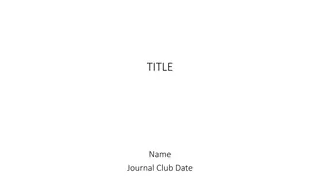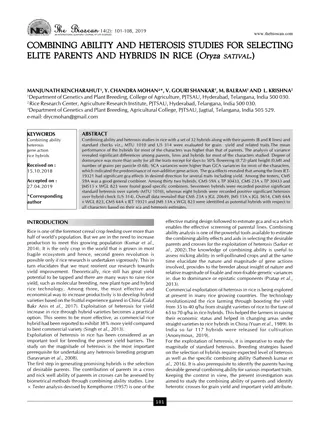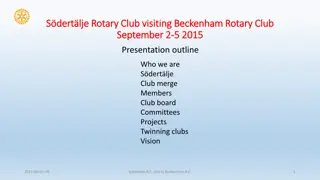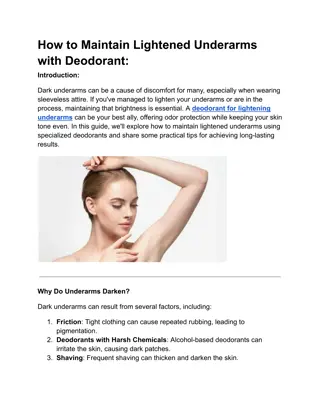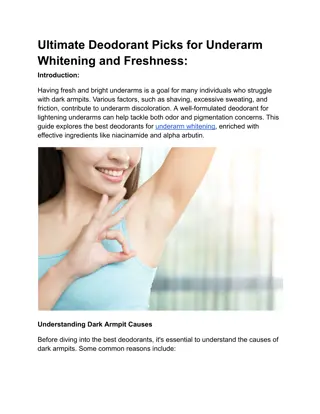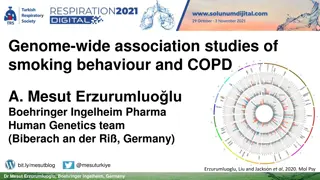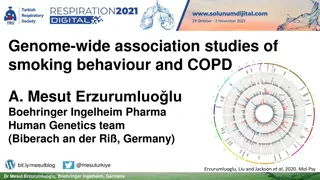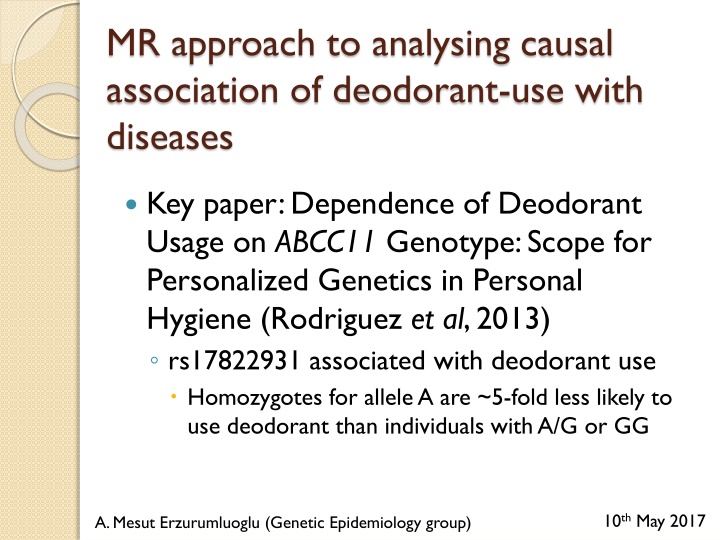
Deodorant Use and Genetic Influence on Personal Hygiene
Discover the genetic basis of deodorant use and its impact on personal hygiene through the rs17822931 genotype in the ABCC11 gene. Explore the Mendelian genetics behind wet earwax and body odor production, shedding light on the association between deodorant use and various diseases. Learn about Mendelian randomization as a powerful tool for analyzing causal associations in genetic epidemiology.
Download Presentation

Please find below an Image/Link to download the presentation.
The content on the website is provided AS IS for your information and personal use only. It may not be sold, licensed, or shared on other websites without obtaining consent from the author. If you encounter any issues during the download, it is possible that the publisher has removed the file from their server.
You are allowed to download the files provided on this website for personal or commercial use, subject to the condition that they are used lawfully. All files are the property of their respective owners.
The content on the website is provided AS IS for your information and personal use only. It may not be sold, licensed, or shared on other websites without obtaining consent from the author.
E N D
Presentation Transcript
MR approach to analysing causal association of deodorant-use with diseases Key paper: Dependence of Deodorant Usage on ABCC11 Genotype: Scope for Personalized Genetics in Personal Hygiene (Rodriguez et al, 2013) rs17822931 associated with deodorant use Homozygotes for allele A are ~5-fold less likely to use deodorant than individuals with A/G or GG 10th May 2017 A. Mesut Erzurumluoglu (Genetic Epidemiology group)
Mendelian genetics Production of wet earwax and axillary odour Recessive mode of inheritance rs17822931 in ABCC11 c.538G>A:p.Gly180Arg Affects apocrine sweat glands by reducing secretion of odorous molecules and its precursors ~99% of Koreans have the AA genotype, which alters the composition of sweat so that they do not produce body odour. Only 2% of Europeans have this genotype
Rodriguez et al, 2013 We found strong evidence (P=3.7e 20) indicating differential deodorant usage according to the rs17822931 genotype. AA homozygotes were almost 5- fold overrepresented in categories of never using deodorant or using it infrequently. However, 77.8% of white European genotypically nonodorous individuals still used deodorant, and 4.7% genotypically odorous individuals did not. We provide evidence of a behavioral effect associated with rs17822931. This effect has a biological basis that can result in a change in the family's environment if an aerosol deodorant is used. It also indicates potential cost saving to the nonodorous and scope for personalized genetics usage in personal hygiene choices, with consequent reduction of inappropriate chemical exposures for some. doi: 10.1038/jid.2012.480
Deodorant-use and disease Deodorant-use unconvincingly (rumoured to be) associated with many diseases Breast cancer Kidney disease Alzheimer s disease Hidradenitis suppurativa Seizures Bone Formation Disorders
Mendelian randomisation (MR) Rationale Alleles are inherited randomly from each parent - > Random allocation of confounding factors Using risk alleles as a proxy for exposure to calculate disease risk estimates Natural randomised controlled trial (RCT) Reference: Neeland & Kozlitina, 2017. Mendelian Randomization. Circulation AT: Atrial fibrillation
Example Example: is increased BMI associated with T2D? Robust association No common cause of G and PB References: Fall et al, 2013. The Role of Adiposity in Cardiometabolic Traits: A Mendelian Randomization Analysis. PLoS Medicine Solovieff et al, 2013. Pleiotropy in complex traits: challenges and strategies. Nat Rev Genet
Potential study Individuals with AA v Individuals with AG or GG genotype for rs17822931 Lower deodorant use in AA group -> Lower incidence of certain diseases in AA group?






